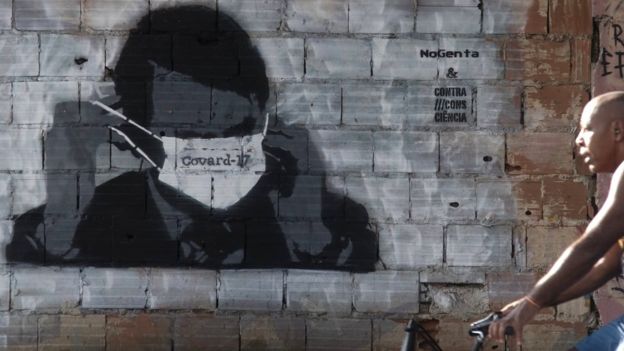
This article is more than
5 year old
Jair Bolsonaro has largely struggled to take it seriously. Going against his own health ministry's advice earlier in March, and while awaiting the results of a second coronavirus test, he left self-isolation to join rallies against Congress.
He shook hands with supporters in Brasilia and sent a message to millions that this was not something to worry about.
In a televised address last week, he repeated a now well-worn phrase. "It's just a little flu or the sniffles," he said, blaming the media once again for the hysteria and panic over Covid-19.
A few days later, he clearly demonstrated his prioritisation of the economy over isolation measures favoured by the rest of the world.
"People are going to die, I'm sorry," he said. "But we can't stop a car factory because there are traffic accidents."
"Jair Bolsonaro is alone right now," says Brian Winter, editor-in-chief of the publication Americas Quarterly. "No other major world leader is denying the severity of this to the extent that he is and depending on how things go, that approach could cost a lot of lives in Brazil."
Jair Bolsonaro is frustrated. He came to power last year promising a better economy and coronavirus has put a stop to that.
Rio's beaches are deserted and the normally gridlocked streets of Sao Paulo are empty. Shops, schools, public spaces and businesses in many states have shut.
So Mr Bolsonaro is determined to make this pandemic political, blaming his adversaries for trying to destroy the country.
A few days ago, a video was shared by Jair Bolsonaro's son, Flavio - a politician himself.
The video's message, which claimed to come from the Brazilian government, was that "BRAZIL CAN'T STOP" (in Portuguese, #obrasilnãopodeparar). People need to keep working to keep the country safe and the economy growing.

The government refused to claim ownership of the video and has since called it "fake news", but it's exactly the message Mr Bolsonaro has been putting out.
So much so, in fact, that a federal judge on Saturday banned the government from campaigning against isolation measures. Government posts on social media using the hashtag were hastily removed.
"He's clearly laying the foundation of being able to say six months to a year from now that he did not agree with tough distancing measures, with the lockdown," says Oliver Stuenkel, Associate Professor of International Relations at the Getulio Vargas Foundation in Sao Paulo.
"It's an attempt to reduce the negative impact that the economic crisis will inevitably have on the approval ratings of the Bolsonaro government but it's a very risky strategy because by minimizing the crisis he's also not leading the response," Mr Stuenkel said.
But Mr Bolsonaro's message resonates with his supporters. In the past few days, many have held motorcades across Brazil, driving through town and honking their horns in support of businesses that want to re-open.
"When you suggest that by going out onto the streets, you could be infected, people become panicked," says Luiz Antonio Santana Caldas, a Bolsonaro supporter from Bahia. "If you are going to be made to quarantine and there's no solution in two weeks, all you're doing is causing the economy to collapse."
Paloma Freitas, a property administrator from Fortaleza, disagrees. She voted for Mr Bolsonaro but she says he no longer represents her.
"Every time I listen to him, I'm terrified," she says. "Instead of uniting, he constantly attacks people. He thinks the country will break but dead people don't generate money, they're not going to make the economy tick unless it's the funeral business."
Sao Paulo's governor, Joao Doria, along with nearly every other governor in the country, has tried to encourage the federal government to support their isolation measures. To no avail. Mr Bolsonaro just accuses them of political games.
"It's not rational to make health and peoples' lives political, especially those who are poor and vulnerable," Mr Doria said, attacking Mr Bolsonaro for not valuing peoples' lives. Mr Doria said that Brazil could - and should - stop.
The din of pot-banging on peoples' balconies has been the soundtrack to many an evening in cities like Sao Paulo and Rio de Janeiro recently. The "panelaços" are a protest against a President they see as irresponsible. A man known for denying science. And a man who looks to Donald Trump as his inspiration.
Read More (...)